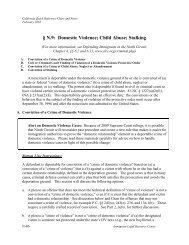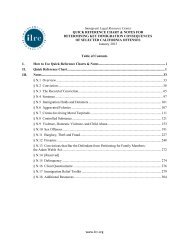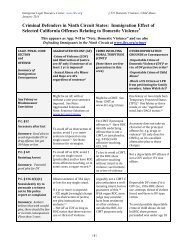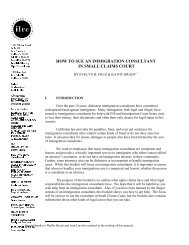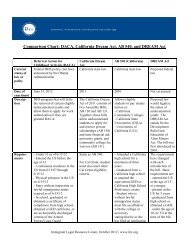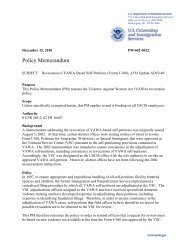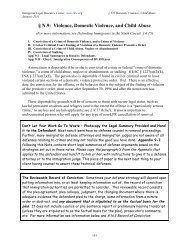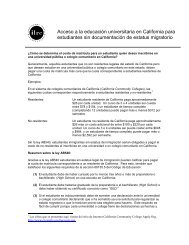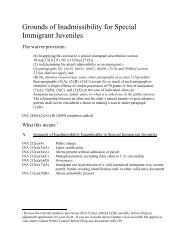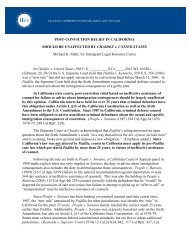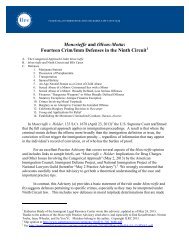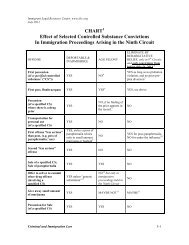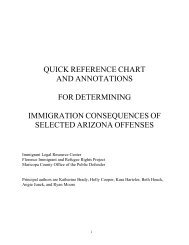quick reference chart and notes for determining immigration - ILRC
quick reference chart and notes for determining immigration - ILRC
quick reference chart and notes for determining immigration - ILRC
Create successful ePaper yourself
Turn your PDF publications into a flip-book with our unique Google optimized e-Paper software.
Cali<strong>for</strong>nia Quick Reference Chart <strong>and</strong> Notes<br />
February 2010<br />
conviction reveals intent to <strong>for</strong>ge, counterfeit, or defraud. Further, under Matter of Silva-<br />
Trevino the <strong>immigration</strong> judge may elect to consult evidence from outside the reviewable record<br />
of conviction, to determine if the offense involved moral turpitude (which here would probably<br />
require fraud). A statement in a written plea bargain that states that the defendant did not intend<br />
to commit fraud, or that tracks the Rathert opinion language, might prevent that.<br />
This should not be used as a safer alternative to avoid the aggravated felony of a fraud or<br />
deceit offense with a loss to the victim/s exceeding $10,000, 212 however, because deceit is<br />
defined more broadly than fraud. Where the record will reflect that loss, it is safer to plead to a<br />
theft offense as defined in PC § 484 <strong>and</strong> let the record of conviction designate, or leave open,<br />
theft as opposed to fraud, while not taking a one-year sentence.<br />
2. Joyriding, Veh. Code § 10851(a)<br />
For the Defendant: A conviction under Calif. H&S § 10851(a) is a divisible statute <strong>for</strong> moral<br />
turpitude purposes, because it includes auto taking with an intent to temporarily deprive the<br />
owner. See, e.g., Matter of M, 2 I&N Dec. 686 (BIA 1946) (§ 10851 predecessor); Castillo-Cruz<br />
v. Holder, 581 F.3d 1154, 1159 (9 th Cir. 2009). Section 10851 is a divisible statute as a “theft”<br />
aggravated felony, because it includes the offense of accessory after the fact, which is not theft<br />
<strong>and</strong> not an aggravated felony. U.S. v. Vidal, 504 F.3d 1072, 1087 (9 th Cir. 2007) (en banc).<br />
Warning on aggravated felony. Even a temporary taking under § 10851 meets the<br />
definition of the aggravated felony “theft,” so that a conviction <strong>for</strong> auto taking is an aggravated<br />
felony if a sentence of a year or more is imposed. 213 However, in United States v. Vidal, supra<br />
the Ninth Circuit held that § 10851 is divisible as an aggravated felony because it also includes<br />
the offense of accessory after the fact, which is not an aggravated felony. Counsel still should<br />
make every ef<strong>for</strong>t to avoid a one-year sentence on a single count of § 10851, however, in case<br />
the U.S. or Cali<strong>for</strong>nia Supreme Court disagree with the finding that § 10851 actually includes<br />
accessory after the fact.<br />
Warning on crime involving moral turpitude. Because joyriding requires only an intent to<br />
temporarily deprive the owner, <strong>and</strong> moral turpitude requires intent to permanently deprive, §<br />
10851(a) is a divisible statute <strong>for</strong> moral turpitude purposes. Under Matter of Silva-Trevino, the<br />
<strong>immigration</strong> judge may decide to take evidence on the underlying facts <strong>for</strong> CMT purposes --<br />
unless criminal defense counsel can plead explicitly to a temporary taking, rather than simply<br />
creating a vague record of conviction. An explicit plea to a temporary taking ought to prevent an<br />
<strong>immigration</strong> judge from finding a CMT even under Silva-Trevino.<br />
212 8 USC § 1101(a)(43)(M)(i).<br />
213 Duenas-Alvarez v. Gonzales, 127 S.Ct. 815 (2007), Matter of V-Z-S-, Int. Dec. 3434 (BIA 2000).<br />
N-134 Immigrant Legal Resource Center



